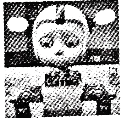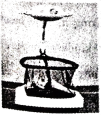-
Robots seem to be getting more and more advanced, as these four examples clearly show.

Simon the Robot was developed by the Georgia Institute of
Technology. He's an upper-torso humanoid robot (上躯干机器人).
Simon the Robot can grasp and release objects, clean up a workspace and
interact with humans. In tests, Simon the Robot could tell whether
someone was paying attention to him.

Budgee was created by Five Elements Robotics. With two wheels and a
little basket, he can carry things for you while you are at the shops or in the
park. You can communicate with him by using an app on your phone, and
set basic commands such as the distance he has to walk behind you.
Budgee can hold up to 22 kilograms and fold up into a small package that
weighs just over 2 kilograms.

Paro is a baby seal (海豹) robot that was designed by
Takanori Shibata. He's used on patients in hospitals and nursing
homes. He can respond to sounds, learn a name and even show
emotions such as surprise, happiness and anger. And he's active
during the day and sleeps at night.

Rover was created by a team at Sydney University and has been
used to herd (放牧) cows. The prototype needs to be operated by a
human but in the future they're hoping to develop a fully_automated
version. As well as herding cows, Rover can also monitor animals that
are about to give birth, and gather data on soil.
1. Which of these robots can help us carry things when shopping?
A. Simon the Robot. B. Budgee.
C. Paro. D. Rover.
2.What can Rover do to help people?
A. Clean up a workspace. B. Nurse patients.
C. Herd cows. D. Show emotions.
3. Which word has the same meaning as the underlined word “commands” ?
A. orders B. purposes
C. introductions D. voices
4. What is special about the robot designed by Takanori Shibata?
A. He is active all day and all night.
B. He can talk with patients.
C. He looks like a baby.
D. He always works in hospitals.
5.Where does this passage possibly come from?
A. sports newspaper. B. A science magazine.
C. A travel guidebook. D. A shopping advertisement.
-
Robots seem to be getting cleverer and cleverer. Here are four examples.
| Budgee 
·He was created by Five Elements Roboties. ·With two wheels and a little basket, he can carry things for you while you’re at the shops. | Paro 
·He was made by Takanori Shibata. ·He is used on patients in hospitals. ·He can learn a name and even show feelings such as surprise, happiness and sadness. |
| Rover 
·He was created by a team at Sydney University. ·He is used to make cows move together from a field to a diary(牛奶场). | Simon 
·He was developed by the Georgia Institute of Technology. ·He can clean up offices. ·In tests, he could tell whether someone was paying attention to him or not. |
1.Which robot can help you when you are shopping?
A. Budgee. B. Simon. C. Paro. D. Rover.
2.We can learn from the passage that Paro .
A. can tell whether others pay attention to him
B. was created by Five Elements Roboties
C. can help cows produce more milk
D. is used on patients in hospitals
3.What can Simon do according to the passage?
A. Show feelings. B. Clean offices.
C. Move cows. D. Learn names.
4.Where does the passage probably come from?
A. health report. B. A tourist map.
C. A science magazine. D. A medical dictionary.
-
Robots seem to be getting cleverer and cleverer. Here are four examples.
| Budgee

·He was created by Five Elements Roboties.
·With two wheels and a little basket, he can carry things for you while you’re at the shops. | Paro

·He was made by Takanori Shibata.
·He is used on patients in hospitals.
·He can learn a name and even show feelings such as surprise, happiness and sadness. |
| Rover

·He was created by a team at Sydney University.
·He is used to make cows move together from a field to a diary(牛奶场). | Simon

·He was developed by the Georgia Institute of Technology.
·He can clean up offices.
·In tests, he could tell whether someone was paying attention to him or not. |
1.Which robot can help you when you are shopping?
A.Budgee. B.Simon. C.Paro. D.Rover.
2.We can learn from the passage that Paro .
A.can tell whether others pay attention to him
B.was created by Five Elements Roboties
C.can help cows produce more milk
D.is used on patients in hospitals
3.What can Simon do according to the passage?
A.Show feelings. B.Clean offices.
C.Move cows. D.Learn names.
4.Where does the passage probably come from?
A.health report. B.A tourist map.
C.A science magazine. D.A medical dictionary.
-
Robots seem to be getting cleverer and cleverer. Here are four examples.
| Budge ●He was created by Robert Hunt. ●With two wheels and a little basket, he can carry things for you while you’re at the shops. |
| Faro ●He was made by Anorak Toshiba. ●He is used for cheering up the patients. He can also look after the patients. He can learn a name and even show feelings such as surprise, happiness and sadness. |
| Rover ●He was created by a team at Sydney University. ●He is used to make cows move together from a field to a dairy(牛奶场). |
| Simon ●He was developed by the Georgia Institute of Technology. ●He is used for cleaning. ●In tests, he could tell whether someone was paying attention to him or not. |
1.We can learn from the passage that Faro .
A.can tell whether others pay attention to him
B.was created by Robert Hunt
C.can help cows produce more milk
D.is mainly used in hospitals
2.What can Simon do according to the passage?
A.Show feelings. B.Clean offices.
C.Move cows. D.Learn names.
3.Where does the passage probably come from?
A.A health report. B.A tourist map.
C.A science magazine. D.A medical dictionary.
-
With the help of computers, reading and writing do not seem so as they used to be.
A.difficult B.more difficult C.most difficult D.the mort difficult
-
---There will be more and more robots going into people’s homes.
--- . We might be able to leave all the chores to them.
A. Not really B. No way
C. You’re kidding D. I hope so
-
---There will be more and more robots going into people’s homes.
--- . We might be able to leave all the chores to them.
A. Not really B. No way
C. You’re kidding D. I hope so
-
—Heavy smog (雾霾 )in eastern and central China seems to get more and more serious.
—I agree. Something ________to deal with it.
A. has done B. is doing C. must be done D. must do
-
—Heavy smog (雾霾 )in eastern and central China seems to get more and more serious.
—I agree. Something ________to deal with it.
A. has done B. is doing C. must be done D. must do
-
—The pollution problem here seems to get more and more serious.
--Yes. Something_____about it.
A. must do B. must be done
C. is doing D. had been done











